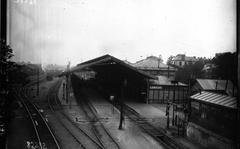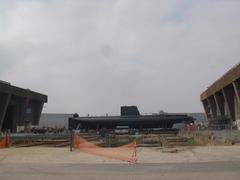Keroman 2 Lorient Visiting Hours, Tickets, and Historical Sites Guide
Date: 14/06/2025
Introduction to Keroman 2 Lorient Historical Site
In the heart of Lorient, Brittany, Keroman 2 stands as a striking relic of World War II naval history. Built by Nazi Germany’s Organization Todt beginning in 1940, this immense, steel-reinforced concrete structure served as a bomb-proof shelter for U-boats and formed a cornerstone of the German Atlantic naval operations. Its thick concrete roof—reaching up to 7 meters—protected critical submarine activities from relentless Allied bombing (Keroman 2: Lorient’s Iconic WWII Submarine Bunker; Keroman 2 Submarine Base: Historical Insights; Keroman 2 Visiting Hours & Tickets).
While the interior of Keroman 2 is generally closed to independent visitors due to ongoing industrial use, its historic essence is accessible through exterior exploration, detailed interpretive panels, and immersive guided experiences at neighboring sites like Keroman 3 and the French submarine Flore-S645 museum. This guide brings together the essential information on visiting hours, ticketing, accessibility, guided tours, and the best nearby attractions for a fulfilling and educational experience at Lorient’s iconic WWII site.
Table of Contents
- Introduction
- Historical Background
- Structure and Engineering
- Post-War Use and Preservation
- Visiting Keroman 2: Practical Information
- What to See and Do
- Practical Visitor Tips
- Frequently Asked Questions (FAQ)
- Visuals and Media Recommendations
- Conclusion and Call to Action
- References and Further Reading
Historical Background
Origins and Strategic Importance
Following the fall of France in 1940, Lorient was selected for the construction of a massive U-boat base due to its strategic location on the Atlantic. Keroman 2 (K2), completed in less than a year, became a central hub for the German Kriegsmarine’s submarine operations. The base featured seven dry pens for U-boats and an innovative mechanical transverser system, enabling rapid repairs and maintenance under layers of nearly impenetrable concrete (military-history.fandom.com; explorabilia.co.uk).
Wartime Operations
Throughout the war, Keroman 2’s advanced features allowed for the efficient movement and servicing of submarines, even as Allied bombing devastated much of Lorient. The base remained functional until Germany’s surrender in 1945, after which it was taken over by the French Navy.
Structure and Engineering
Reinforced Concrete Construction
Keroman 2’s design is a testament to wartime engineering, with a roof thickness varying from 3.4 to 7 meters of reinforced concrete. The structure was built to withstand the most powerful bombs of the era, ensuring the survival of both the submarines and the crews within.
Dry Dock System and Mechanical Transversers
Due to the peninsula’s solid bedrock, engineers developed a unique system: a single wet dock coupled with mechanical transversers to transfer submarines to dry pens within minutes. This design maximized protection and operational efficiency (uboat-bases.com; explorabilia.co.uk).
Internal Facilities and Logistics
Each pen included two bridge cranes, facilitating the handling of heavy equipment and torpedoes. The transverser pen featured upper and lower sections for storage and accommodation, reflecting the base’s blend of functionality and resilience.
Post-War Use and Preservation
After liberation, the French Navy repurposed the base, renaming it Base Ingénieur Général Stosskopf. The site continued to serve military and industrial roles until 1997. Today, while parts of Keroman 2 are off-limits due to ongoing industrial use, its legacy is preserved through museums, guided tours, and cultural events (uboat-bases.com).
Visiting Keroman 2: Practical Information
Visiting Hours and Tickets
- Keroman 2: The exterior is accessible year-round, free of charge.
- Guided Tours (Keroman 3 and Museums):
- April–October, 10:00 AM–6:00 PM (last admission 5:30 PM).
- Closed Mondays and Tuesdays.
- Tickets: Adults €10; reduced €7; children under 12 free. Combined tickets available for multiple attractions.
- Advance Booking: Strongly recommended, especially during peak season (Keroman 2 Visiting Hours & Tickets).
Guided Tours and Language Availability
Access to the interior of Keroman 2 is generally by guided tour only, with regular English-language tours available in high season or by arrangement. Multilingual audio guides are offered in English, French, German, Dutch, Italian, Spanish, and Portuguese.
Accessibility
Most public areas, including the museums and guided tours, are wheelchair accessible, with ramps and elevators provided. Due to the historic nature of the site, some areas have limited access—contact the visitor center in advance for assistance.
Getting There
- By Train: Lorient is reachable from Paris by TGV in around 3 hours.
- By Car: Parking is available at La Base, well signposted from the city.
- By Public Transport: Local buses and a water bus service connect the city center and La Base.
- By Cruise Ship: The Keroman Terminal is a short walk from the site.
What to See and Do
Exterior Exploration
Stroll around the colossal exterior of Keroman 2, with interpretive panels explaining its construction and use. Panoramic views of Lorient’s harbor and the adjacent bunkers provide excellent photographic opportunities.
Museum Highlights and Guided Tours
- Keroman 3 (K3) Bunker: Take a 90-minute guided tour, including rooftop access for sweeping views and insights into WWII submarine warfare.
- Sous-marin Flore-S645 Museum: Board the preserved French Daphné-class submarine and explore interactive exhibits detailing submarine operations and life during wartime.
- Davis Tower and Rescue Simulator: Visit the 1942 survival training facility, with exhibits on submarine rescue and decompression chambers.
Nearby Attractions
- Cité de la Voile Éric Tabarly: Explore Brittany’s premier sailing museum with interactive exhibits and simulators (Cité de la Voile Eric Tabarly).
- Lorient Fishing Port: Witness early-morning fish auctions.
- Tour des Vents: Enjoy panoramic views or try the zip line.
- Groix Island: Take a ferry for a day trip to this scenic island.
Events and Activities
Keroman hosts maritime festivals, sailing competitions, concerts, and family-friendly workshops throughout the year, making it a vibrant cultural hub.
Practical Visitor Tips
- Book Early: Especially during summer and on weekends.
- Arrive 15 Minutes Before Tour: Tours depart promptly.
- Dress for the Weather: The bunker is cool and damp year-round.
- Footwear: Wear sturdy, comfortable shoes.
- Photography: Allowed in most areas, but flash and tripods may be restricted indoors.
- Facilities: Restrooms, cafés, gift shops, and picnic areas are available.
- Dogs: Only guide and assistance dogs are permitted.
Frequently Asked Questions (FAQ)
Q: Can I enter Keroman 2’s interior on my own?
A: No, due to industrial use, interior access is by guided tour only and usually focused on neighboring Keroman 3.
Q: What are the ticket prices?
A: Adults €10; reduced €7; children under 12 free. Combined tickets are available for multiple attractions.
Q: Are English-language tours available?
A: Yes, especially during high season or by request.
Q: Is the site accessible for wheelchair users?
A: Most public areas are accessible, but some historic sections have limitations.
Q: What’s the best time to visit?
A: April–June and September–October offer mild weather and fewer crowds.
Visuals and Media Recommendations
- Use high-resolution images of Keroman 2’s exterior and interior, with alt tags such as “Keroman 2 submarine bunker Lorient” and “WWII submarine dry dock inside Keroman 2.”
- Embed a map of Lorient showing the location of Keroman 2.
- Offer links to official virtual tours and multimedia galleries for online visitors.
Conclusion and Call to Action
Keroman 2, together with the broader submarine base complex, embodies Lorient’s crucial role in World War II and its enduring maritime spirit. While the bunker’s interior is largely off-limits, the surrounding attractions—guided tours, museums, and cultural events—offer a compelling journey into history and engineering. Book your tickets online, prepare for an engaging visit, and enhance your experience with digital audio guides from the Audiala app. For the latest updates, check official sources and follow Lorient’s historical sites on social media.
References and Further Reading
- Visiting Keroman 2: Lorient’s Historic WWII Submarine Bunker - Hours, Tickets, and Tips, 2025 (Keroman 2: Lorient’s Iconic WWII Submarine Bunker)
- Keroman 2 Submarine Base: Visiting Hours, Tickets & Historical Insights in Lorient, 2025 (Keroman 2 Submarine Base: Historical Insights)
- Keroman 2 Visiting Hours, Tickets & Attractions: Exploring Lorient’s Historic Submarine Bunker, 2025 (Cité de la Voile Éric Tabarly)
- Keroman 2 Visiting Hours, Tickets, and Guide to Lorient’s Historic Submarine Base, 2025 (Keroman 2 Visiting Hours & Tickets)

